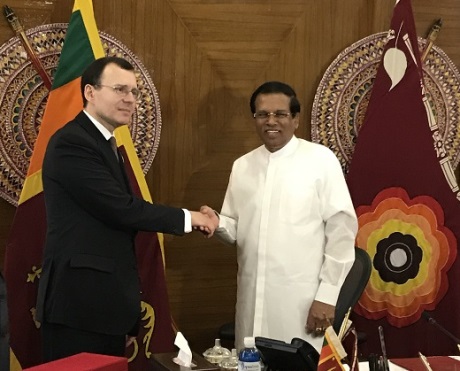Russia and Sri Lanka have held talks this week on establishing cooperation in the peaceful uses of nuclear energy. Nikolay Spassky, deputy director general of Russian state nuclear corporation Rosatom, met with Ranjith Siyambalapitiya and Susil Premajayantha, respectively Sri Lanka's minister of power and renewable energy and minister of science, technology and research, on 16-17 January.

Spassky meeting Sri Lankan President Maithripala Sirisena (Image: Rosatom)
The Russian delegation, which was welcomed by Sri Lankan President Maithripala Sirisena also held talks with the Atomic Energy Board and the Atomic Energy Regulatory Council of Sri Lanka.
Rosatom said the parties had "discussed in detail the whole range of issues related to establishing cooperation between the Russian Federation and Sri Lanka in the peaceful use of atomic energy", adding that "the dialogue will continue". Spassky invited the inter-departmental delegation to visit Russia for further talks and see Russian nuclear facilities. They also discussed Sri Lanka's participation this year in Rosatom's annual conference and exhibition Atomexpo.
In September 2010, the Sri Lankan government commissioned its Atomic Energy Board to conduct a pre-feasibility study on using nuclear energy for power generation from about 2025. In 2011, Sri Lanka announced that it would establish an Atomic Energy Regulatory Council to allow for the introduction of nuclear power generation technology in the country, and also to address concerns over the security of radioactive sources and to deal with radiation emergencies.
In February 2015, Sri Lanka and India signed an agreement to cooperate in civil nuclear energy. The accord aims to facilitate cooperation in the transfer and exchange of knowledge and expertise, sharing of resources, capacity building and training of personnel in peaceful application of nuclear energy - including the use of radioisotopes - nuclear safety, radiation safety and nuclear security. It would also facilitate cooperation in radioactive waste management and nuclear and radiological accident mitigation and environmental protection.
The Nuclear Medicine Unit at the University of Peradeniya in Sri Lanka has been supported by the International Atomic Energy Agency (IAEA) for over 40 years. The centre, the only one of its kind in the country, uses nuclear medicine to diagnose, treat and manage cancer and other diseases. IAEA support includes the provision of equipment, training and the implementation of safety standards.
Priyanee Wijesekera, ambassador and permanent representative of Sri Lanka, told the 60th Regular Session of the IAEA General Conference, in Vienna, Austria, in September 2016 that the establishment of an independent regulatory authority "demonstrates Sri Lanka's dedication and commitment towards ensuring absolutely peaceful nature of nuclear applications and the use of nuclear technology in Sri Lanka".